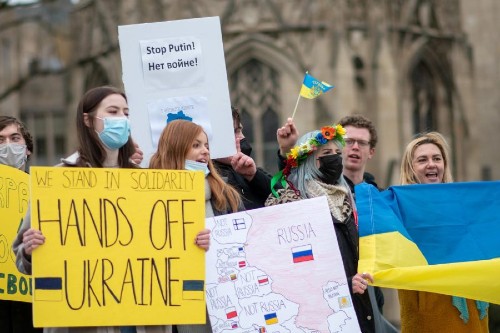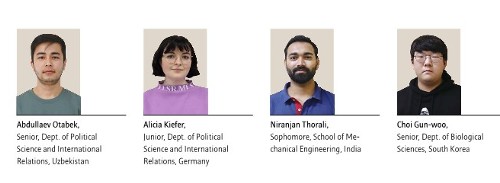
South Korea has the lowest percentage of the National Assembly under the age of 40 in major countries in the world, according to the Inter-Parliamentary Union’s data. The highest countries were the following three countries – Denmark, Finland, and Sweden. Every country has its own different situations and problems, but they have the same need for youth politics. With young voices, they have new and different views from older generations and better policies may come from it. For example, environmental policies in which young people get more interested than the older generations exert a huge influence on younger generations, who have been very influential when it comes to these policies. Like this, in various parts, voices of the youth are needed. The Chonnam Tribune brings various opinions from international and Korean students on youth politics.
What is the current status of youth politics in your country?
Abdullaev Otabek (Uzbekistan): Uzbekistan has always pursued active youth-oriented policies. In 2020, the government announced the establishment of the “Youth Parliament” – an advisory body with 100 nationally elected youths aged between 18 and 30 under the supervision of the Upper House of the National Assembly. Another example of such initiatives is the “Youth Alliance” – a government-backed NPO whose aim is to "improve youth participation in the political, social and economic reforms carried out by the government.” But the problem is that the majority of the Uzbek youth hardly identifies with the objectives put forward by such state-run organizations. They see these projects as government tools designated to keep youths’ political views in line with that of the regime.
Alicia Kiefer (Germany): In Germany, the legal voting age is 18 nationally, but in some federal states, youths can vote for local and federal state government at the age of 16. In our universities, we have exclusive youth politics since we have our own parties there. In general, every German party has their own youth organizations, where young people, between 14 and 35, can operate. Also, my federal state Nordrhein-Westfalen will implement a right for children to attend a full-time school, which is not the default in Germany yet. The opportunity to attend a full-time school may bring more equal learning opportunities, as not all parents can help their children with their education the same way.
If you could be a young politician, what would you like to change the most or be involved in?
Niranjan Thorali (India): I would like to be involved in sports policies. With a population of 1.3 billion multicultural people in India, talent seems to be lost somewhere. We have seen how proper training and polishing created wonders in recent international events. Engaging in sports not only creates an international image of a country but also makes the country’s population healthy.
Choi Gun-woo (South Korea): In Korea, the housing problem is one of the hardest ones for the young. House rent is increasing unceasingly, and to make the matter worse, it is getting harder to get a job and make money. But still, there is no clear solution for this situation.
Alicia: I think it is really important for every person to have an equal social status. It should not matter if your parents are working in a factory or if they work as professors. Every child should have equal opportunities to go to universities, so I would like to change the current social equality.
Why do you think youth politics is necessary?
Abdullaev: Historically, youth engagement has been crucial in every politically consequential movement across the world. Take, for instance, the Gwangju Democratization Movement in which students from our very own university played a central role in the struggle against the dictatorial government. This global grassroots movement has once again shown that it is the youth who are the change makers and it is in the national interest of any country to realize the importance of youth politics.
Alicia: Youth politics is linked with other policy fields. If decisions are made in areas like, for example, local public transportation, internet infrastructure or affordable rents, it surely comes back to the Youth. We should keep it in our mind that these decisions influence the younger generation. So it is really important to have strong Youth Politics in a country. Youth Politics is necessary if we want a future where generations can grow up easily.
What do you think is the most desirable attitude for college students to have regarding youth politics?
Gun-woo: Having a critical mind is important in my opinion. These days, many social problems stem from uncritical behaviors where people just accept the distorted information without clear clues in social media platforms and messengers. Therefore, it is really important to face the problem with various points of view and also keep our eyes on the policies with a critical mind.
Abdullaev: First, I should say that I personally regard political participation as a moral duty of every citizen and those who think otherwise are not worthy of a democratic government and deserve to be ruled by a despot. With that in mind, college students must be more politically active and demanding in every way, because, it is us who are going to be in charge of the political system, the environment, and the economy. The elderly will leave us behind in the near future.
In this rapidly changing world, youth from different countries each have different problems. Social equity, house rent problems, which students mentioned above, are the ones that have a huge effect on our future life. A lot of new social problems are also turning up every year. Consequently, youth politics is important. With critical minds, we, the youth, should engage in political and decision-making processes and use the right to participate in politics. Because we are the generation whose future life will be largely impacted by politics. The more we want a better life, the more the eyes of young people in politics are needed.
**********************************************************************************************

Abdullaev Otabek, Senior, Dept. of Political Science and International Relations, Uzbekistan
Alicia Kiefer, Junior, Dept. of Political Science and International Relations, Germany
Niranjan Thorali, Sophomore, School of Mechanical Engineering, India
Choi Gun-woo, Senior, Dept. of Biological Sciences, South Korea
By Hong Ji-u, Student Editor

